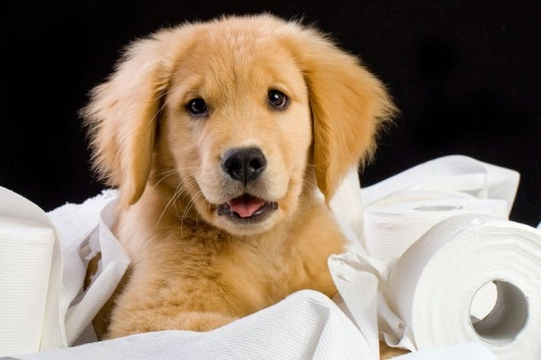
Toileting Issues with Dogs: Causes and Solutions
Dealing with toileting issues is a common challenge for dog owners. These problems can arise during puppy training, in elderly dogs, or due to medical conditions, behavioural changes, or environmental factors. Understanding the cause is essential to find the right solution and ensure your dog feels comfortable and confident.
Common Causes of Toileting Problems in Dogs
Toileting issues can stem from several causes which include:
- Puppy House Training: Accidents are expected as puppies learn where and when to go. Patience and consistent training are key.
- Ageing: Older dogs may develop incontinence or mobility issues that hinder proper toileting.
- Medical Conditions: Urinary tract infections, bladder weakness (especially common in desexed older females), spinal or nerve problems can affect bladder and bowel control.
- Behavioural Factors: Changes in the dog’s environment, fear (such as noise phobias), stress, or rebellious behaviour during adolescent phases can lead to toileting in inappropriate places.
- Separation Anxiety: Dogs stressed when left alone may have indoor toileting accidents.
The Place to Go: Encouraging Correct Toilet Location
Even if your dog should know where to toilet, reinforcing the correct place is beneficial. When your dog goes outside in the right spot, offer praise warmly to encourage repetition. Observation is vital to know when they toilet, without hovering anxiously.
If your dog toilets indoors, clean the area thoroughly with products designed to remove all scent traces linked to bodily fluids. Dogs have sensitive noses and can detect even faint residual smells, which can encourage repeat accidents in the same spot.
Sometimes, dogs avoid toileting during walks due to overstimulation or stress from other dogs, people, or noises. Professional advice can help reduce anxiety and make walks more enjoyable.
If your dog refuses to toilet in your garden, you can train them to use a designated area, taking them there on a lead and rewarding them on success. This helps maintain your garden while providing an acceptable toileting spot.
The Time to Go: Establishing a Routine
Providing regular opportunities for toileting, especially at key times, reduces accidents. Common times to offer a toilet break include:
- On waking from sleep (including naps)
- After meals
- After play sessions
- Before leaving the house
- Before bedtime
Establishing a strong routine helps your dog anticipate toilet times, making requests less necessary. When your dog signals needing outside, open the door quietly without encouraging games or noise. Teaching a verbal cue associated with toileting, such as "go potty," helps them understand the expected behaviour.
Handling Accidents Calmly and Effectively
If you discover indoor toileting accidents, avoid shouting or punishment. Your dog may feel confused or fearful without understanding the cause of your upset. Catching a dog in the act is difficult and loudly reacting will not stop the behaviour.
Calmly move your dog outside to finish if you find them mid-accident, but never punish after the fact. Instead, focus on prevention strategies like adjusting schedule, access, or addressing anxiety causes.
Consistent, non-stressful cleaning with enzyme-based cleaners prevents dogs from repeatedly soiling the same spot due to scent markers.
If toileting issues occur frequently when your dog is left alone, professional help may be needed to address potential separation anxiety.
Coprophagia: Understanding and Managing Faeces Eating
Coprophagia, or faeces eating, can be puzzling and unpleasant for owners. It may be a natural puppy behaviour copied from the mother, an attention-seeking habit, or simply a matter of taste.
For sporadic cases, calmly interrupt your dog and reward them when they leave the faeces alone. Avoid dramatic reactions that may reinforce attention-seeking behaviour.
Adding small amounts of pineapple or courgette to your dog's diet can make faeces taste less appealing. Supervised outdoor time and recalls can help prevent your dog consuming other animals' faeces, with praise reinforcing good behaviour.
Rolling in Faeces: Instincts and Cleaning Tips
Rolling in faeces or other strong scents is an instinctive behaviour inherited from wild ancestors to mask their own scent from predators or rivals. This can be frustrating after grooming.
Fox faeces is a common favourite for dogs. To remove the stubborn smell, use household items like tinned tomatoes, tomato juice, or ketchup. Saturate the coat, massage gently, then rinse thoroughly to neutralise the odour.
Veterinary and Professional Support
If toileting problems are persistent, unexpected, or accompanied by other symptoms, seek veterinary advice promptly. Medical problems like urinary tract infections, bladder disorders, or neurological issues require diagnosis and treatment.
Certified professional trainers or behaviourists can assist if behavioural causes or anxiety factors are identified as the root of toileting issues. This helps create a tailored, compassionate training plan promoting positive outcomes for both dog and owner.
Responsible dog ownership includes patience, understanding, and providing proper medical care and behavioural support, which ensures happier pets and families.
Ensuring access to veterinary care and seeking advice from reputable trainers and behavioural experts enhances your dog's wellbeing and the success of any toileting programme.



